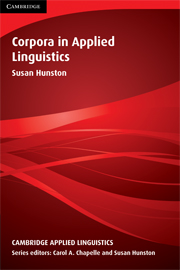Book contents
- Frontmatter
- Contents
- Series editors' preface
- Acknowledgements
- 1 Introduction to a corpus in use
- 2 The corpus as object: Design and purpose
- 3 Methods in corpus linguistics: Interpreting concordance lines
- 4 Methods in corpus linguistics: Beyond the concordance line
- 5 Applications of corpora in applied linguistics
- 6 Corpora and language teaching: Issues of language description
- 7 Corpora and language teaching: General applications
- 8 Corpora and language teaching: Specific applications
- 9 An applied linguist looks at corpora
- List of relevant web-sites
- References
- Index
5 - Applications of corpora in applied linguistics
Published online by Cambridge University Press: 05 October 2012
- Frontmatter
- Contents
- Series editors' preface
- Acknowledgements
- 1 Introduction to a corpus in use
- 2 The corpus as object: Design and purpose
- 3 Methods in corpus linguistics: Interpreting concordance lines
- 4 Methods in corpus linguistics: Beyond the concordance line
- 5 Applications of corpora in applied linguistics
- 6 Corpora and language teaching: Issues of language description
- 7 Corpora and language teaching: General applications
- 8 Corpora and language teaching: Specific applications
- 9 An applied linguist looks at corpora
- List of relevant web-sites
- References
- Index
Summary
The application of corpora expected to have most relevance to readers of this book – language teaching – is dealt with in chapters of its own (chapters 6–8). In this chapter, other applications are described. These are:
The production of dictionaries and grammars, that is, reference books for language learners and translators.
The use of corpora in critical linguistics, illuminating items of importance to the study of ideologies.
The use of corpora in translation.
The contribution of corpora to literary studies and stylistics.
The use of corpora in forensic linguistics.
The use of corpora in designing writer support packages.
Dictionaries and grammars
Introduction
Corpora have so revolutionised the writing of dictionaries and grammar books for language learners (or rather, for learners of English) that it is by now virtually unheard-of for a large publishing company to produce a learner's dictionary or grammar reference book that does not claim to be based on a corpus. As a result, this is probably the application of corpora that is most far-reaching and influential, in that even people who have never heard of a corpus are using the product of corpus investigation. Accounts of using corpora to write dictionaries are found in Sinclair (ed.) 1987; Summers 1996; Baugh et al 1996; Clear et al 1996.
- Type
- Chapter
- Information
- Corpora in Applied Linguistics , pp. 96 - 136Publisher: Cambridge University PressPrint publication year: 2002
- 1
- Cited by



